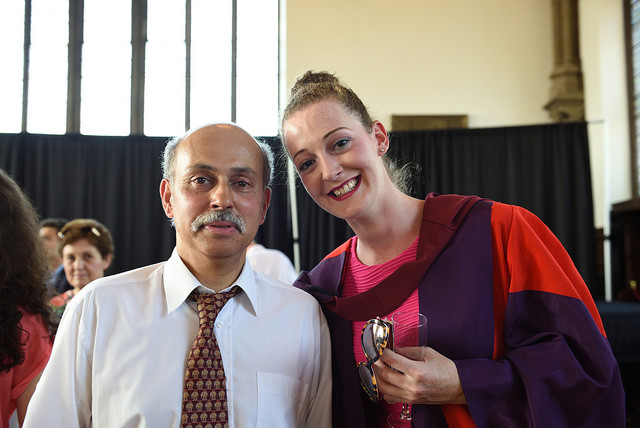You studied at Bristol before returning to work in the PG admissions team. What was the appeal?
I studied history here between 1973-1976; at the time I intended to teach. Sport played a major role in my time here. I played for the hall rugby team, was the sports rep for my hall and ran for the university occasionally. I also met my wife Claire, when she came to borrow some sports equipment! We had good memories of our time here as students.
You say you had ambition to be a teacher. Did that ever become a reality?
I was initially interested in doing a PhD and gaining some teaching experience that way, but with a postgraduate degree in US studies finding PhD opportunities proved difficult at the time. On completing my Master’s, I secured a job in the Postgraduate Student Administration team at the Medical Research Council, before going to Westminster College where I worked in the Admissions Unit and as a site administrator. The appeal of teaching had always been to help young people fulfil their potential. Through these roles I felt part of a process that enabled young researchers and students to achieve their goals.
Who have you been most inspired by during your time at the university?
I admire all students who have obtained their degrees while coping with a number of difficulties. I also respect those who managed to combine their studies with top level sport particularly, Georgie Twigg (Olympic Gold medal winner, Hockey), Jazmin Sawyers (Commonwealth Silver medallist, Long Jump) and Eboni Beckford-Chambers (Commonwealth Gold, Netball). They demonstrate how much an individual can achieve, not just on talent alone, but also with a lot of hard work.
One of my childhood heroes was the 1968 Olympic gold medallist, Kip Keino, the Kenyan middle-distance runner, whom I met when he received an honorary degree from the university. He was not only a great athlete but a compassionate man with a lifelong devotion to aiding young children - taking many orphans into his own home, and latterly setting up a school to educate over 400 children.
Sport has clearly played a big role in your life. How has that impacted your working life?
My father was an able sportsman. He was born in Kerala in South India and loved football and tennis. I didn’t inherit his natural talent so had to work hard at any sport I tried.
I think that it is important to have other interests apart from work or studies. Taking part in and watching sport are two of the ways I relax. I have attended a number of Olympics and was lucky to see Georgie Twigg and Jazmin Sawyers at the London and Rio Games.
As a 6-year-old, what did you want to be when you grew up?
I remember travelling back from Guyana when I was about 6. We’d spent three years there and were returning to the UK on a cargo ship with a few other passengers. During that time we got to know the chief engineer and his wife and I became fascinated with being a marine engineer. I guess I was impressed by this person who was responsible for moving this huge ship – and how, if there was a problem, he had to figure it out and find a solution. It turned out that I wasn’t very good at physics so marine engineering remained a dream. I know that problem-solving is an important skill but I don’t think that I could articulate that at the age of 6!
What is your proudest moment during your time at the Law School?
I was shortlisted for an award by the Students Union for supporting students. I hope that having empathy for students, finding time to let them talk about what they’re struggling with and encouraging them may have played a small role in helping them achieve their goals.
What are your plans for retirement?
Of course, attending more sporting events! Claire and I first combined sports with culture when we went to World Athletics Championships in Rome in 1987. From then on we were hooked. We came back and saved for four years for the World Championships in Tokyo in 1991. We’re hoping to do the same in retirement. First Berlin for the European Athletic Championships, then the Tokyo 2020 Olympics and Eugene for the 2021 World Athletics Championships again. There’s also a cricket world cup in 2019. In between, I’ve promised to tidy up my home office which is full of sports programmes and sports memorabilia.
Finally, what advice do you have for students just starting out on their career after university?
I remember the former Vice-Chancellor saying at a graduation ceremony, “Be flexible. Don’t rule anything out.” I have done jobs and tasks such as computer programming, running training sessions and speaking in front of an audience of 300 university administrators that as a student I never thought I could do. In this day and age when a job isn’t for life – a flexible approach is what’s needed.
